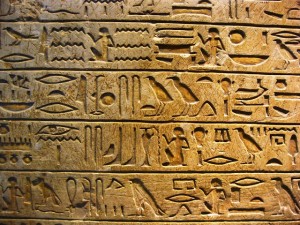The Lev Manovich writing on “Database as Symbolic Form” attempts to answer the question of ‘what is a database?’ It looks at etymology of the term as well as its current uses and associations, and looks at the differences bettwen database and narrative.
The reading suggests that a database is a cluster of singular items and is unaffected by narrative. Mia provided a great summary of this:
Databases do not tell stories; they don’t have a beginning or end; in fact, they don’t have any development, thematically, formally or otherwise, that would organise their elements into a sequence. Instead, they are collections of individual items, where every item has the same significance as any other.
According to Manowich, narrative is modern, while database is post-modern. I tend to disagree with this. Narrative is suggested to belong to the modern era because it is found within technologies of that era, such as print and visual technologies. Let’s use the example of ancient Egyptian hieroglyphics. These symbols conveyed meaning and told a story, or retold events, similar to narrative fiction or historical non-fiction. Narrative has existed long before the modern era. It has existed as long as communication has.
Quid hodie fecisti?
Primo expergefactus venatu nemorum ueni draconum. Ego fessus sum ignem et antrum rediit - Ancient Latin
What did you do today?
First I woke up, then I went hunting in the woods for dragons. I was tired so I returned home to my cave and made a fire. – Translation
Even though that is completely historically inaccurate, my point is that his recount of his day is in itself a narrative. Only during the modern era did society develop tools to mass produce and redistribute narrative, such as the printing press.
I put foreword a similar yet less-profound argument to the idea that database is only post-modern. Bill Seaman defines database as “derived through human activity leading to residues and/or inscriptions of experience”. Manovich defines it as “a structured collection of data”. These are two simple, to-the-point definitions. The readings then proceed to discuss it in terms of computers and the internet. But must data be digital? A man is locked in solitary prison with the only means of recording the passing days is by engraving into the wall. This is a collection of data. He also engraves a tally for each meal he eats. Another collection of data. Could it then be said that multiple data collections therefore becomes a database?
I’ve definitely gone on a huge tangent here. Maybe my cynicism can be attributed to my cancelled lecture, causing me to write unnecessarily early in the morning when I could still be face to face with my pillow. I feel like Angus, trying to find a way to disagree with everything I read. His post actually made a strong point, linking this reading back to the claim that the internet is not a narrative because it has no beginning middle or end. It doesn’t necessarily have an ending as the Internet is still growing, however Angus suggests that the term ‘Web 2.0’ should be justification enough to realise it has chapters and therefore a beginning and middle.
Betty is right is her admiration of Nethaniel, who once again provides an excellent synopsis of this week’s reading.

